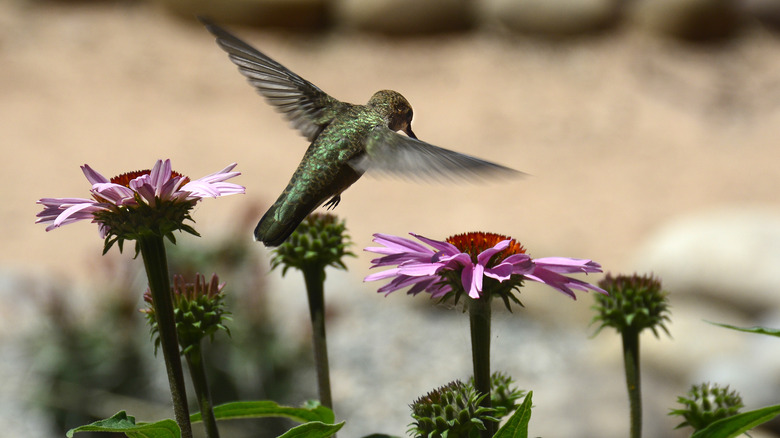The Perfect Hummingbird Feeder You Can DIY From Your Recycling Bin
We may receive a commission on purchases made from links.
Are you lamenting a lack of teeny feathered friends in your garden? One likely reason hummingbirds are steering clear of your yard is that there are no easy-to-access sources of food. After all, a hummingbird eats at least fifty percent of its body weight in nectar a day. (And supplements that with insects, if you're curious.) Don't worry; we have a nifty way to remedy that — though, fair warning, it does involve rummaging through that pile of recycling you've been putting off sorting. If you're even slightly handy, you can make a lightweight, durable hummingbird feeder from a humble soda can, some wire or an old coathanger, some plastic caps ends or other protectors, and some painter's tape.
The crucial element in this DIY is the aluminum soda can. It forms the body of your hanging hummingbird feeder. The soft metal these cans are made of — as opposed to the more rigid tinned food cans — makes them easy to punch holes in and otherwise manipulate. If you don't drink much soda or other canned beverages at home, you might not have many cans lying around. That's okay; ask your family, friends, or neighbors to save a couple for you. Alternatively, buy an 18-pack of Coke for $10.92 on Amazon and ask those same people to help you drink it! The bonus of using a Coke or similarly crimson-hued can is that hummingbirds are well-known to be attracted to red, orange, and yellow flowers.
Gather your materials
You can buy empty cans online — for example, Crowlers and More sells four boxes (1268) of 12-ounce cans for $380.00 — but the minimum order quantities typically far exceed the needs of this DIY project. You'll also need something to line the feeding hole with — a short length of rubber tube cut to size or plastic cap ends — the little plastic covers used by tradespeople to enclose pipes, tubes, or wire — work great. You'll also need a round, flexible plastic receptacle without a lid roughly the same diameter as the mouth of the can. You could use an upcycled takeaway container or, again, a larger cap end.
Nervous? Don't be! This can feeder is one of the many DIY hummingbird feeders that are impossibly easy to make. Grab a roll of red spectrum-hued painter's tape — Walmart has a three-pack of red, yellow, and green tape for $10.97 — and something sturdy to hang the feeder with. Get 10 feet of avian-safe 10-gauge stainless steel wire for $10.00 from A Bird Toy or upcycle an old metal coat hanger (it already has the hook). Tool-wise, you'll need a can opener, sharp scissors, an awl or electric drill, a metal hole punch, and a pair of needle-nose pliers (if you're using the wire instead of a coat hanger).
Transform that soda can
Use the can opener to remove the tab-end of the can. Handle with care; the cut end might be sharp. Drill two holes on opposite sides of the unopened end of the can, just below the flat bottom. You'll thread the wire or coat hanger through here. Turn the can right way up again and place one strip of tape around an inch long, each on opposite sides of the can right down near the bottom. Use your metal hole punch to cut holes in the middle of each piece of tape. The holes should be a little less than the diameter of your rubber tubing or small cap ends.
Cut two pieces of tubing, each about half an inch long. Press those through the holes. Alternatively, use the small cap ends. Lift the tape and use scissors to shape the ends into imitation flowers or hummer drinking holes. Thread the 10-gauge stainless steel wire through the top (formerly the bottom) of the can, twisting the ends to create a hook to hang your feeder from a tree branch or exposed porch rafter. Using a coat hanger? Pull it apart where one end loops around itself, right under the hook. Thread that end through the holes in the can and reconnect it. All that's left now is to fill the round container with nectar — homemade hummingbird nectar is surprisingly easy to make — and gently squeeze the sides as you slide it into the bottom of the feeder.

